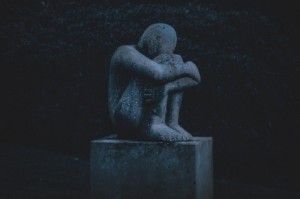Playlist #16: Loving the Alien
It’s 40 years since David Bowie unleashed Ziggy Stardust onto an unsuspecting world. Marc Hall celebrates the milestone, playlist style!
40 years ago this month – June 6, 1972 to be precise, David Bowie released arguably his most noted album, The Rise and Fall of Ziggy Stardust and the Spiders from Mars. Often seen as his breakthrough album, it was actually his 5th LP following on from the previous year’s Hunky Dory. After experimenting with partial characterisation – as Major Tom – Bowie finally found his niche as the extravagant, androgynous alien Ziggy Stardust. Courting controversy with an ambiguous gender image and sexually charged lyrics, Bowie’s knack for a catchy hook was a sure-fire hit with the kids.
Little did he know at the time – or perhaps he did – David Bowie had just created a masterpiece that was to inspire not only generations of musicians to come, but put in place a successful template he was to repeat several times in the future with his constant re-inventions.
Always having a keen eye on the musical landscape surrounding him, Bowie has morphed from a range of genres that read like a history of popular music. Like a magpie, Bowie’s love of all that glittered saw him lift the elements that took his fancy. From the baroque pop of his debut album, through glam (Ziggy), blue eyed soul (Young Americans), krautrock (Low), and art rock (Scary Monsters), to the bubblegum of the 1980s (Let’s Dance).
Following the critical mauling his mid-to-late 80s output received, Bowie once again reverted to type, repeating his chameleon like output, and dabbling with electronic music on Black Tie White Noise. It was 1997’s Earthling which caused the biggest commotion by encompassing elements of Drum and Base and Techno.
I’ve got to admit I’m a self-confessed Bowie apologist. In my late teens, I was re-introduced to Bowie via the oddity that is Earthling, so despite the negative backlash at the time, rightly or wrongly it has a special place in my heart. If not for Earthling, I would never have gone out the next week to pick up a copy of Ziggy Stardust, probably the most important record purchase of my life.
In succumbing to Ziggy Stardust, I had unwittingly opened a door; from my initial listen to the slow opening drums of Five Years I knew I’d found my record. I’m obviously not the only person who’s felt this way. As a Bowie fan, you can never ‘own’ him, or lay claim to having discovered this great lost musician. It’s a shared experience. You have to accept that he has had the same impact on friends, colleagues and other bands you listen to.
There can’t be many musicians who have such a wide and varied reach across so many different cultures and societies. Take Seu Jorge as an example. Performing almost entirely in Portuguese, it was with his amazing take on Bowie’s songs in Wes Anderson’s movie The Life Aquatic with Steve Zissou that he achieved crossover success. After listening to Jorge, Bowie himself even commented on how he started to hear an inner beauty in his own songs he was not previously aware of.
Bowie’s reach stretches beyond that of your standard ‘legendary’ artist, if there is such a thing. He’s been cited as a hero by bands of almost every genre from 70s punkers, to 90s techno, and mainstream pop music. Boy George does not hide that he cloned himself as a Bowie wannabe, and despite the Madonna comparisons, Lady Gaga surely grew up with an eye on Bowie.
Many of the artists that were to influence Bowie’s constant metamorphosis were delighted to be part of his evolution rather than see him as treading on their toes. Bowie often attached himself to the bandwagon that was already rolling. Famed collaborations over the years have included everybody from Lou Reed and Brian Eno to Arcade Fire and Nine Inch Nails.
NIN is an interesting example, as Bowie’s 1995 LP 1.Outside heavily featured music reminiscent to their own industrial rock. Despite going on to record and tour with Trent Reznor and co, Bowie has always denied that 1.Outside was influenced by NIN, instead saying the influence was little known Swiss band The Young Gods. Incidentally another band Bowie toured with.
So, here we are. 40 years after the release of Ziggy Stardust, and following heart surgery in 2004, Bowie appearances are becoming more and more sporadic. We’ve had the occasional highlight such as performing with Arcade Fire and his great spot in mega fan Ricky Gervais’ Extras.
Weather he ever returns regularly to the stage again remains to be seen; I suppose I should be eternally grateful that I came to Bowie during the start of a period which saw frequent tours and festival appearances. Over the years I’ve seen hundreds of live performances, but the one moment that will forever stick with me was the first seconds of my first David Bowie performance.
Headlining the 1997 Pheonix Festival, a solo David Bowie strolled onto stage, guitar in hand and started strumming the opening bars of Quicksand. Talk about the hairs on the back of your next standing up. Beautiful.
BBC4 are screening a variety of Bowie-related material from 9pm this evening





